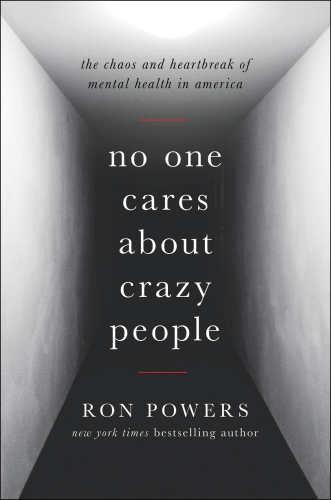
No One Cares About Crazy People
The Chaos and Heartbreak of Mental Health in America
کتاب های مرتبط
- اطلاعات
- نقد و بررسی
- دیدگاه کاربران
نقد و بررسی

October 31, 2016
This resounding rebuke to scornful attitudes toward the mentally ill takes its title from a notably insensitive 2010 email exchange between high-level staffers of Scott Walker during his run for Wisconsin governor. Using that moment as a touchstone of indifference, Powers (Mark Twain: A Life) weaves a dual tale of the personal and the political. In one thread, he traces the history of public efforts to ameliorate (or, more often, hide) the plight of those living with mental illness, from London’s infamous Bedlam in the 18th and 19th centuries, where wealthy visitors were charged admission to gawk at the inmates, to America’s present-day prison-industrial complex. In the other, he tells his own family’s heartrending story of grappling with disease: both of his sons have struggled with schizophrenia, and his younger son, Kevin, lost his life to it in 2005. Along with grief, this section of the book is full of joy, serving as a loving tribute to Powers’s sons and putting a human face on serious mental illness for anyone lucky enough never to have been forced to confron it. Readers will surely be moved by this double portrait of one family’s days of happiness and sorrow, and the world’s halting and flawed attempts to care for troubled people.

Starred review from January 1, 2017
Pulitzer Prizewinning writer Powers shares his family's struggles as two sons suffer from schizophrenia. Youngest son Kevin ends up committing suicide by hanging himself in the basement just before turning 21. Older son Dean remains under treatment for the disease. So much pain and loss, helplessness and frustration. Powers recalls the boys' darkening moods, increasing opaqueness, and psychotic episodes. He points out a major obstacle to survival is anosognosiaa lack of insight into one's condition, a faulty belief that nothing's wrong with your mind. His very emotional memoir also covers some of the history, legislation, pharmacology, and science of schizophrenia. He reminds us how apathetic and cruel society can be when it comes to mental illness. Consider the colloquial nomenclature: loonies, lunatics, nutcases, psychos, wackos. He reviews the tsunami of miscalculations and mistakes in the 1960s that launched mental-health care on a terrible trajectory: the denouncing of psychiatry, dosing patients with new drugs to make them more docile, and releasing hundreds of thousands of mentally ill individuals from psychiatric hospitals and community-health centers. Presently, prisons are America's biggest mental-health facilities. Powers grieves, Too many of the mentally ill in our country live under conditions of atrocity. Shame on us.(Reprinted with permission of Booklist, copyright 2017, American Library Association.)

September 15, 2016
A Pulitzer Prize-winning journalist and New York Times best-selling author, Powers offers a detailed social history of mental illness in this country. His story is heartrendingly personal, as both of his sons have suffered from schizophrenia, with Kevin taking his own life in 2008 after a courageous battle. With a 50,000-copy first printing.
Copyright 2016 Library Journal, LLC Used with permission.

December 1, 2016
Educating general readers about mental illness and its troubled history in America, Pulitzer Prize winner Powers (Mark Twain: A Life) shares his searingly personal, heart-wrenching account of the schizophrenia that overtook his two talented, promising sons. In loving detail, Powers describes the joys and unfathomable challenges inherent in parenting two such blessed and simultaneously cursed young men. Most arresting is his narrative about his younger son, Kevin, a guitar prodigy. As a child, Kevin fell in love with playing the guitar and went on to dedicate his life to music. At the prestigious Berklee College of Music, he spiraled into inexplicable mental illness, and in the throes of depression, hanged himself in the basement one week before his 21st birthday. Older son Dean, a talented writer, also suffers from mental illness, but, with treatment, ultimately stabilizes. Powers alternates chapters between the history of his sons and the larger history of systemic mental health treatment failures in the United States. Ultimately, he sacrifices privacy, as he offers this book in powerful argument for necessary revised legislation. VERDICT For readers of Pete Earley's Crazy. [See Prepub Alert, 8/22/16.]--Lynne Maxwell, West Virginia Univ. Coll. of Law Lib., Morgantown
Copyright 2016 Library Journal, LLC Used with permission.

























دیدگاه کاربران